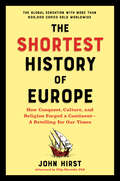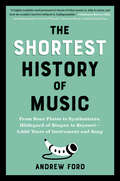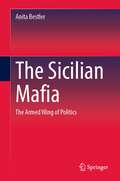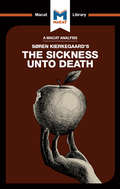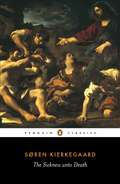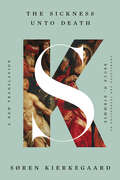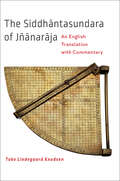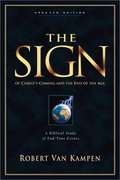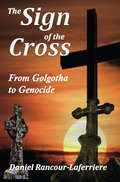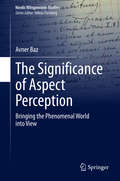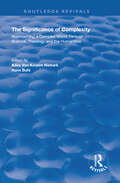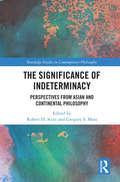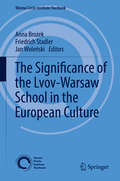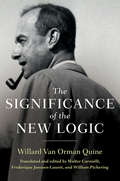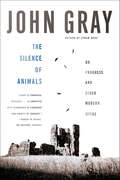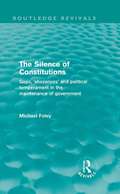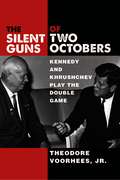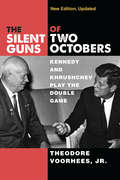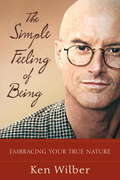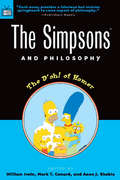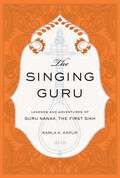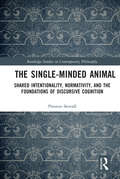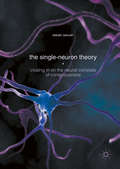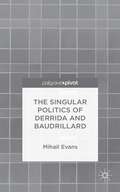- Table View
- List View
The Shortest History of Europe: How Conquest, Culture, And Religion Forged A Continent--a Retelling For Our Times (Shortest History #0)
by James HirstUncover the decisive moments that shaped a world-changing continent. The Shortest History books deliver thousands of years of history in one riveting, fast-paced read. Celebrated historian John Hirst draws from his own lectures to deliver this ultra-accessible master class on the making of modern Europe, from Ancient Greece through World War II. With over 600,000 copies sold worldwide, this brief history is a global sensation propelled by a thesis of astonishing simplicity: Just three elements—German warfare, Greek and Roman culture, and Christianity—come together to explain everything else, from the Crusades to the Industrial Revolution. Hirst’s razor-sharp grasp of cause and effect helps us see with sparkling clarity how the history of Europe—the crucible of liberal democracy—shapes the way we live today.
The Shortest History of Music: From Bone Flutes to Synthesizers, Hildegard of Bingen to Beyoncé - 5,000 Years of Instrument and Song (The Shortest History Series)
by Andrew FordFrom prehistoric songwriting to digital recording, discover the history of the world’s favorite art form No other art is as popular—or pervasive—as music. With just a few clicks, anyone can cue up (and critique) Chopin or Cher, The Bangles or The Beatles—even the brand-new Beyoncé. But things weren’t always this way. In this brisk, breakneck history under 300 pages, award-winning composer, author, and broadcaster Andrew Ford replays the dramatic evolution of music, from early oral songs to the first orchestras (and their wealthy patrons) and from the emergence of recording technology to the multibillion-dollar industry we know today. The Shortest History of Music explores the immense influence of religion, politics, and the economy on world music, what led humans to make music in the first place, and why—in every era—we are irresistibly drawn to listen to it. The Shortest History books deliver thousands of years of history in one riveting, fast-paced read.
The Sicilian Mafia: The Armed Wing of Politics
by Anita BestlerThis book offers a completely new approach to the complex social phenomenon of the Mafia: In addition to the origins, organization and actions of the Mafia, the author Anita Bestler examines above all the close connection between organized crime and politics. In the process, readers [also] gain an interesting insight into the complicated political development of Italy from the founding of the state to the present, as well as an answer as to why Italians have a different political mindset.
The Sickness Unto Death
by Shirin ShafaieSøren Kierkegaard’s The Sickness unto Death is widely recognized as one of the most significant and influential works of Christian philosophy written in the nineteenth century. One of the cornerstones of Kierkegaard’s reputation as a writer and thinker, the book is also a masterclass in the art of interpretation. In critical thinking, interpretation is all about defining and clarifying terms – making sure that everyone is on the same page. But it can also be about redefining terms: showing old concepts in a new light by interpreting them in a certain way. This skill is at the heart of The Sickness unto Death. Kierkegaard’s book focuses on the meaning of “despair” – the sickness named in the title. For Kierkegaard, the key problem of existence was an individual’s relationship with God, and he defines true despair as equating to the idea of sin – something that separates people from God, or from the idea of a higher standard beyond ourselves. Kierkegaard’s interpretative journey into the ideas of despair, sin and death is a Christian exploration of the place of the individual in the world. But its interpretative skills inspired generations of philosophers of all stripes – including notorious atheists like Jean-Paul Sartre.
The Sickness Unto Death: A Christian Psychological Exposition of Edification and Awakening by Anti-Climacus
by Soren KierkegaardOne of the most remarkable philosophical works of the nineteenth century, The Sickness Unto Death is also famed for the depth and acuity of its modern psychological insights. Writing under the pseudonym Anti-Climacus, Kierkegaard explores the concept of 'despair', alerting readers to the diversity of ways in which they may be described as living in this state of bleak abandonment - including some that may seem just the opposite - and offering a much-discussed formula for the eradication of despair. With its penetrating account of the self, this late work by Kierkegaard was hugely influential upon twentieth-century philosophers including Karl Jaspers, Jean-Paul Sartre and Albert Camus. The Sickness unto Death can be regarded as one of the key works of theistic existentialist thought - a brilliant and revelatory answer to one man's struggle to fill the spiritual void.
The Sickness Unto Death: A New Translation
by Søren KierkegaardThe first new translation of Kierkegaard’s masterwork in a generation brings to life this impassioned investigation of the self. The “greatest psychologist of the spirit since St. Augustine” (Gregory R. Beabout), Soren Kierkegaard is renowned for such richly imagined philosophical works as Fear and Trembling and The Concept of Anxiety. Yet only The Sickness unto Death condenses his most essential ideas—on aesthetics, ethics, and religion—into a single volume. First published in 1849 under the pseudonym Anti-Climacus, The Sickness unto Death is as demanding as it is concise, posing fundamental yet complicated questions about human nature and the self. Beginning with the biblical story of Lazarus, whom Jesus miraculously raised from the dead, The Sickness unto Death identifies the titular “sickness” as “despair,” a state worse than death because it is “unto” death. As Kierkegaard demonstrates, despair—or, in Christian categories, “sin”—is a sickness not of the body, but of the spirit, and thus, of the self. A dramatic “medical history” of the course of this sickness, The Sickness unto Death culminates, as all medical histories do, in a crisis, a turning point at which the self, the patient, either realizes or abandons itself. Given the choice between eternal salvation and extinction, Kierkegaard calls upon the self to become receptive in faith to God’s mercy, “even today, even at this hour, even at this instant.” With his “historian’s eye” (Vanessa Parks Rumble) and “lucid and informative” (George Pattison) introduction, Bruce H. Kirmmse deftly situates The Sickness unto Death in the historical context of the European revolutions of 1848, reminding us that even Kierkegaard was a product of his time and place. Yet as Kirmmse ultimately shows, The Sickness unto Death is as apt for our times as for mid-nineteenth-century Europe, speaking to the human soul across generations and centuries.
The Siddhāntasundara of Jñānarāja: An English Translation with Commentary
by Toke Lindegaard KnudsenThe first English translation of this major work of classical Indian astronomy and mathematics.A treasure for anyone interested in early modern India and the history of mathematics, this first English translation of the Siddhāntasundara reveals the fascinating work of the scholar-astronomer Jñānarāja (circa 1500 C.E.). Toke Lindegaard Knudsen begins with an introduction to the traditions of ancient Hindu astronomy and describes what is known of Jñānarāja’s life and family. He translates the Sanskrit verses into English and offers expert commentary on the style and substance of Jñānarāja's treatise.The Siddhāntasundara contains a comprehensive exposition of the system of Indian astronomy, including how to compute planetary positions and eclipses. It also explores deep, probing questions about the workings of the universe and sacred Hindu traditions. In a philosophical discussion, the treatise seeks a synthesis between the cosmological model used by the Indian astronomical tradition and the cosmology of a class of texts sacred in Hinduism. In his discourse, which includes a discussion of the direction of down and adhesive antipodeans, Jñānarāja rejects certain principles from the astronomical tradition and reinterprets principles from the sacred texts. He also constructs a complex poem on the seasons, many verses of which have two layers of meaning, one describing a season, the other a god's activities in that season. The Siddhāntasundara is the last major treatise of Indian astronomy and cosmology to receive serious scholarly attention, Knudsen’s careful effort unveils the 500-year-old Sanskrit verses and shows the clever quirkiness of Jñānarāja's writing style, his keen use of mathematics, and his subtle philosophical arguments.
The Sign
by Robert Van KampenRobert Van Kampen takes the Scripture at face value and tells of the dooming end of age and the biblical prophecy concerning the last days.
The Sign of the Cross: From Golgotha to Genocide
by Daniel Rancour-LaferriereThis book presents a unique effort to create a new understanding of the Christian sign of the cross. At its core, it traces the conscious and unconscious influence of this visual symbol through time. What began as the crucifixion of a Jewish troublemaker in Roman-occupied Judea in the first century eventually gave rise to a broad spectrum of readings of the instrument used to accomplish such a punishment, a cross. The author argues that Jesus was a provocative, grandiose masochist whose suffering and death initially signified redemption for believers. This idea gradually morphed into a Christian sense of freedom to persecute and wage war against non-believers, however, as can be seen in the Crusades ("wars of the cross"). Many believers even construed the murder of their savior as a crime perpetrated by "the Jews," and this paranoid notion culminated in the mass murder of European Jews under the sign of the Nazi hooked cross (Hakenkreuz). Rancour-Laferriere's book is expertly written and argued; it will be readable to a large audience because it touches on many areas of controversy, interest, and scholarship. The work is critical, but not unfair; it employs psychoanalysis, art history (the study of the symbol of the cross in works of art), religion and religious texts, and world history generally. The interweaving of these various themes is what gives this work its ability to draw in readers-and will ultimately be what keeps the reader interested through the conclusion.
The Significance of Aspect Perception: Bringing the Phenomenal World into View (Nordic Wittgenstein Studies #5)
by Avner BazIn this volume, Baz offers a wide-ranging discussion of Wittgenstein’s remarks on aspect-perception, with special focus on Wittgenstein’s method. Baz starts out with an interpretation of Wittgenstein’s remarks on aspects and continues with attempts to characterize and defend Wittgenstein’s approach to the understanding and dissolution of philosophical difficulties. Baz ends with attempts to articulate—under the inspiration of Merleau-Ponty’s phenomenology—certain dissatisfactions, both with Wittgenstein’s remarks on aspect perception, and with his philosophical approach more generally. On the way, Baz explores connections between Wittgenstein’s remarks on aspects and Kant’s aesthetics. He examines ways in which the remarks on aspects may be brought to bear on contemporary philosophical work on perception. He discusses some of the implications of Wittgenstein’s work on aspect perception for issues in moral philosophy and the philosophy of action.
The Significance of Complexity: Approaching a Complex World Through Science, Theology and the Humanities
by KEES VAN KOOTEN NIEKERK Hans BuhlOriginally published in 2004. Thanks to computer simulations science is beginning to understand complex natural processes such as the weather, earthquakes and the evolution of life. The Significance of Complexity deals with the importance of the sciences of complexity - for the humanities and theology. First, three scientists explain the science of complexity and illustrate it with concrete examples. Second, two scholars consider the concept of complexity and possible applications of complexity theory within the humanities, e.g. as a tool to understand the interplay between the artist, the work of art and the user in interactive art. Finally, three theologians ask what can be learned from the science of complexity for a religious understanding of humankind and the world. The Significance of Complexity is a pioneering work exploring the import of a fascinating new branch of science for human self-understanding. It caters for all those who are interested in relating science to the quest for the meaning of life.
The Significance of Indeterminacy: Perspectives from Asian and Continental Philosophy (Routledge Studies in Contemporary Philosophy)
by Robert H. Scott Gregory S. MossWhile indeterminacy is a recurrent theme in philosophy, less progress has been made in clarifying its significance for various philosophical and interdisciplinary contexts. This collection brings together early-career and well-known philosophers—including Graham Priest, Trish Glazebrook, Steven Crowell, Robert Neville, Todd May, and William Desmond—to explore indeterminacy in greater detail. The volume is unique in that its essays demonstrate the positive significance of indeterminacy, insofar as indeterminacy opens up new fields of discourse and illuminates neglected aspects of various concepts and phenomena. The essays are organized thematically around indeterminacy’s impact on various areas of philosophy, including post-Kantian idealism, phenomenology, ethics, hermeneutics, aesthetics, and East Asian philosophy. They also take an interdisciplinary approach by elaborating the conceptual connections between indeterminacy and literature, music, religion, and science.
The Significance of the Lvov-Warsaw School in the European Culture
by Friedrich Stadler Anna Brożek Jan WoleńskiThis volume is a result of the international symposium "The Tradition of the Lvov-Warsaw School in European Culture," which took place in Warsaw, Poland, September 2015. It collects almost all the papers presented at the symposium as well as some additional ones. The contributors include scholars from Austria, the Netherlands, Ireland, and Poland. The papers are devoted to the history and reception of the Lvov-Warsaw School, a Polish branch of analytic philosophy. They present the School's achievements as well as its connections to other analytic groups. The contributors also show how the tradition of the School is developed contemporarily. The title will appeal to historians of analytic philosophy as well as historians of philosophy in Central Europe.
The Significance of the New Logic
by Walter Carnielli Willard Van Quine Frederique Janssen-Lauret William PickeringW. V. Quine was one of the most influential figures of twentieth-century American analytic philosophy. Although he wrote predominantly in English, in Brazil in 1942 he gave a series of lectures on logic and its philosophy in Portuguese, subsequently published as the book O Sentido da Nova Lógica. The book has never before been fully translated into English, and this volume is the first to make its content accessible to Anglophone philosophers. Quine would go on to develop revolutionary ideas about semantic holism and ontology, and this book provides a snapshot of his views on logic and language at a pivotal stage of his intellectual development. The volume also includes an essay on logic which Quine also published in Portuguese, together with an extensive historical-philosophical essay by Frederique Janssen-Lauret. The valuable and previously neglected works first translated in this volume will be essential for scholars of twentieth-century philosophy.
The Silence of Animals: On Progress and Other Modern Myths
by John GrayA searching, captivating look at the persistence of myth in our modern world"By nature volatile and discordant, the human animal looks to silence for relief from being itself while other creatures enjoy silence as their birthright."In a book by turns chilling and beautiful, John Gray continues the thinking that made his Straw Dogs such a cult classic. Gray draws on an extraordinary array of memoirs, poems, fiction, and philosophy to re-imagine our place in the world. Writers as varied as Ballard, Borges, Conrad, and Freud have been mesmerized by forms of human extremity—experiences that are on the outer edge of the possible or that tip into fantasy and myth. What happens to us when we starve, when we fight, when we are imprisoned? And how do our imaginations leap into worlds way beyond our real experiences?The Silence of Animals is consistently fascinating, filled with unforgettable images and a delight in the conundrum of human existence—an existence that we decorate with countless myths and ideas, where we twist and turn to avoid acknowledging that we too are animals, separated from the others perhaps only by our self-conceit. In the Babel we have created for ourselves, it is the silence of animals that both reproaches and bewitches us.
The Silence of Constitutions: Gaps, 'Abeyances' and Political Temperament in the Maintenance of Government (Routledge Revivals)
by Michael FoleyFirst published in 1989, Michael’s Foley’s book deals with the ‘abeyances’ present in both written and unwritten constitutions, arguing that these gaps in the explicitness of a constitution, and the various ways they are preserved, provide the means by which constitutional conflict is continually postponed. Abeyances are valuable, therefore, not in spite of their obscurity, but because of it.
The Silent Guns of Two Octobers: Kennedy and Khrushchev Play the Double Game
by Theodore VoorheesThe Silent Guns of Two Octobers uses new as well as previously under-appreciated documentary evidence to link the Cuban Missile Crisis to the Checkpoint Charlie tank standoff to achieve the impossible—craft a new, thoughtful, original analysis of a political showdown everyone thought they knew everything about. Ultimately the book concludes that much of the Cold War rhetoric the leaders employed was mere posturing; in reality neither had any intention of starting a nuclear war. Theodore Voorhees reexamines Khrushchev’s and Kennedy’s leadership, decision, and rhetoric in light of the new documentary evidence available. Voorhees examines the impact of John F. Kennedy's domestic political concerns about his upcoming first midterm elections on his handling of the Cuban Missile Crisis through his use of back-channel dealings with Khrushchev during the lead-up to the crisis and in the closing days when the two leaders managed to reach a settlement.
The Silent Guns of Two Octobers: Kennedy and Khrushchev Play the Double Game
by Theodore VoorheesThe Silent Guns of Two Octobers uses new as well as previously under-appreciated documentary evidence to link the Cuban Missile Crisis to the Checkpoint Charlie tank standoff to achieve the impossible—craft a new, thoughtful, original analysis of a political showdown everyone thought they knew everything about. Ultimately the book concludes that much of the Cold War rhetoric the leaders employed was mere posturing; in reality neither had any intention of starting a nuclear war. Theodore Voorhees reexamines Khrushchev’s and Kennedy’s leadership, decision, and rhetoric in light of the new documentary evidence available. Voorhees examines the impact of John F. Kennedy's domestic political concerns about his upcoming first midterm elections on his handling of the Cuban Missile Crisis through his use of back-channel dealings with Khrushchev during the lead-up to the crisis and in the closing days when the two leaders managed to reach a settlement.
The Simone Weil Reader
by Simone WeilAs a book The Simone Weil Reader has its own special and autonomous identity, containing the essence of Simone Weil's thought in its representative scope, range, focus.
The Simple Feeling of Being: Visionary, Spiritual, and Poetic Writings
by Ken WilberThe author of nineteen books of philosophy and psychology, Ken Wilber is a pioneering thinker who has developed an integral "theory of everything" that embraces the truths of both Eastern spirituality and Western science. Yet while he is best known for his scholarly research into the world's contemplative traditions, Wilber is also an accomplished spiritual practitioner and mystic in his own right. In order to highlight the personal wisdom of this popular author, the editors of The Simple Feeling of Being have assembled a collection of inspirational, mystical, and instructional passages drawn from his publications. These heartfelt writings, born of Ken's own meditation practice and inner experiences, include:Poetic passages of contemplative insights and reflectionsInspired descriptions of Spirit, Nondual Awareness, the Witness, One Taste, and other topicsCommentary on the spiritual contributions of figures such as Ralph Waldo Emerson, Saint Teresa of Ávila, Meister Eckhart, and Ramana MaharshiAnecdotes of personal experience and glimpses into Wilber's inner worldPractical spiritual instructions and guided meditations
The Simpsons and Philosophy
by William Irwin Mark T. Conard Aeon J. SkobleThis unconventional and lighthearted introduction to the ideas of the major Western philosophers examines The Simpsons - TV's favorite animated family. The authors look beyond the jokes, the crudeness, the attacks on society - and see a clever display of irony, social criticism, and philosophical thought. The writers begin with an examination of the characters. Does Homer actually display Aristotle's virtues of character? In what way does Bart exemplify American pragmatism? The book also examines the ethics and themes of the show, and concludes with discussions of how the series reflects the work of Aristotle, Marx, Camus, Sartre, and other thinkers.
The Singing Guru: Legends and Adventures of Guru Nanak, the First Sikh
by Kamla K. KapurPart fiction, history, and mythology, this unconventional retelling of the life of divine spiritual master Guru Nanak, founder of the Sikh religion and revered by Muslims and Hindus alike, provides an intimate look at the enlightened Guru while bringing his ancient wisdom to a modern audience.From the best-selling author of Ganesha Goes to Lunch and Rumi&’s Tales from the Silk Road comes an original novel about the life and travels of Guru Nanak, a musician, enlightened thinker, and one of the most beloved figures in Eastern spirituality. In this fascinating book, Kamla K. Kapur weaves together facts, legends, folktales, myths, and over forty of Guru Nanak&’s poems—preserved in the Sikh holy book, the Granth Sahib—to form this captivating depiction of the leader&’s life. From being seduced by deadly women to almost getting eaten by cannibals, the exciting account presented in The Singing Guruincludes moral tales without being proselytizing. Factual details are intermingled with fantasy to produce a symbolic portrait in which humor and imagination combine to convey a profound and entertaining spiritual narrative.
The Single-Minded Animal: Shared Intentionality, Normativity, and the Foundations of Discursive Cognition (Routledge Studies in Contemporary Philosophy)
by Preston StovallThis book provides an account of discursive or reason-governed cognition, by synthesizing research in the philosophy of language, the philosophy of mind, and evolutionary anthropology. Using the grasp of a natural language as a model for the autonomous or self-governed rationality of discursive cognition, the author uses a semantics for individual intentions, shared intentions, and normative attitudes as a framework for understanding what it is to be a rational animal. This semantics interprets claims about shared intentions and claims about what people ought and may do as the expression of plans of action that involve taking the points of view of other people within a community. This has important consequences for our understanding of both the natural basis and the social relevance of intentional and normative mental states. In order to distinguish the strong and weak modal force, which characterizes normativity but not shared intentionality, the author argues that a notion of single-minded practical cognition is necessary. This account of single-mindedness is then used to shed light on the autonomy or self-government characteristic of discursive cognition, as manifest in a linguistic community whose members are able to adopt the standpoints of others. Drawing together research in philosophy and the related sciences, the formal account of the semantic content of the claims we use to give expression to shared intentional and normative mental states integrates well with research in cognitive science, evolutionary anthropology, and social psychology concerning the ontogenetic and phylogenetic development of shared intentionality and norm psychology in human beings and other primates. The Single-Minded Animal will appeal to researchers and advanced students working on shared intentionality, normativity, rationality, cognitive science, social and developmental psychology, and evolutionary anthropology.
The Single-Neuron Theory
by Steven SevushThis book presents an engaging account of a provocative new theory which explores how our brain generates conscious experience and where this occurs. It suggests that conscious experience happens not at the whole brain level but at the level of individual nerve cells. The notion that the brain as a whole is sentient is an illusion created by the exquisite organization of the individually conscious neurons. Despite appearances to the contrary, conscious behavior that seems to be the product of a single macroscopic mind is actually the integrated output of a chorus of microscopic minds, each associated with an individual neuron. The result is a theory that revolutionizes our conception of who and what we are.
The Singular Politics of Derrida and Baudrillard
by Mihail EvansRecent years have seen the rise of anti-politics as a political phenomenon. Beyond this new rejection of the political class there has long existed a deeper challenge to the political itself. Identifying the work of Derrida as 'a politics' and that of Baudrillard as 'transpolitics' this book charts convergences and divergences in their approaches.
